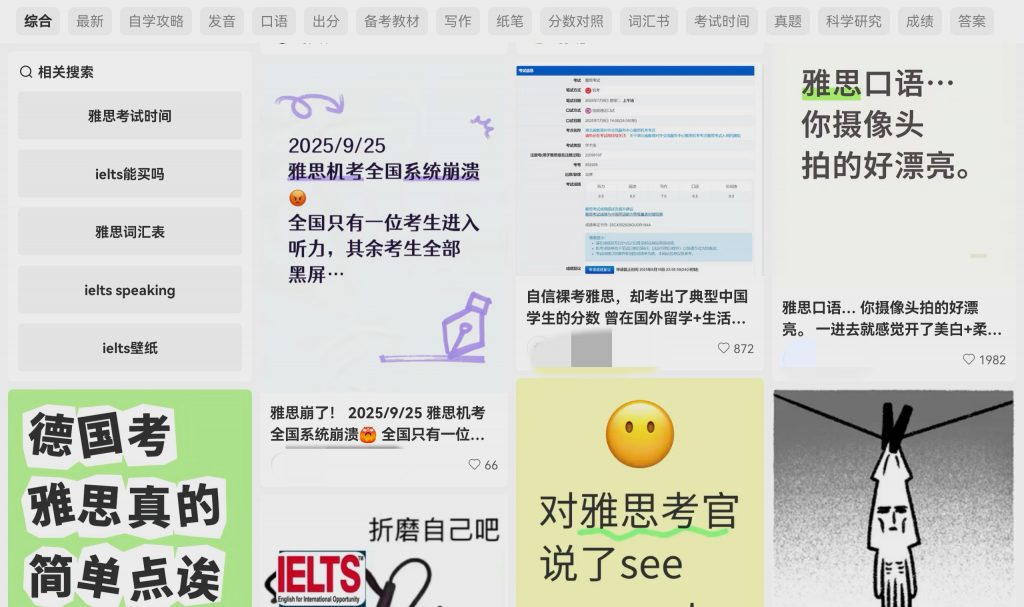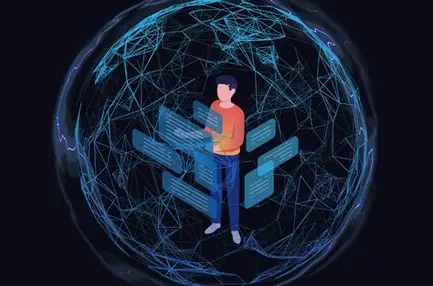“The internet is showing us what it thinks we want to see, but not necessarily what we need to see.”
Pariser, E. (2011). The filter bubble: What the internet is hiding from you. Portfolio.
The annoying procrastination
It all started with my procrastination.After deciding to study abroad as an exchange student at Leiden University, I had roughly a month to prepare for the IELTS exam-the mandatory golden ticket to my journey. But I’ve always been a chronic procrastinator (thankfully, it’s gotten much better now). Back then, the winter break coincided with this period, and I dived into relaxation for two whole weeks. It wasn’t until later that I awake to the fact that this exam was coming soon.I then started searching for IELTS-related content on various social media platforms. With time pressing, I couldn’t afford to sit through long courses or lengthy experience shares, which is why REDnote stood out among all the platforms.

Most users here post content in the form of images and texts, and the age demographic aligns closely with mine. The IELTS topic also enjoys high popularity on the platform.Many IELTS-specific bloggers offer free study materials (like must-memorize vocabulary and essay-writing tips), while numerous test-takers who scored well share their writing templates and spoken test questions.It felt like a godsend to me,which perfectly matching my need to quickly access exam materials and test-taking experiences. Thus began my routine of solving practice questions on my own while frequently turning to REDnote for searches.
I let social media lead me by the nose
Due to my frequent searches and interactions, the algorithm had tailored my REDnote feed to nothing but IELTS content.Gradually, I noticed subtle shifts in the recommended posts. I kept coming across stories of test-takers who messed up their exams and failed to get the required score on the first try, or those who shared that despite acing the Gaokao (China’s national college entrance exam) English section, their IELTS results were only mediocre. With little time left for preparation, I was totally anxious.

That’s when big data kicked in again, as if it had detected my unease. I started receiving frequent dm on REDnote from IELTS tutoring institutions and teachers, most of which were promoting courses and emphasizing the necessity of signing up. At first, I stayed unmoved, but as the messages piled up, I began to waver. Eventually, I replied to one of the bloggers, added their WeChat (similar to switching from Instagram to WhatsApp), and they spent a long time on a call telling me that with so little time left, self-study would be nearly impossible and that I had to find professional teachers. Even though I knew they were sensationalizing the situation a bit, my emotions were fully controlled by social media at that point. In the end, I spent around 300 euros on their course.
How did I get trapped in an Information Cocoon,step by step?
Those 300 euros bought me a vivid example of how algorithms and platforms build an Information Cocoon step by step. Users’ posts, along with their likes, comments, and saves on others’ content, let algorithms capture their recent focuses(such as the tags added to posts).
Like Deleuze argued that in the society of control,we no longer be surveilled,but be captured.The platform then relevant content on the homepage, gradually forging a closed Information Cocoon within this ostensibly open space.In this regime platforms will predict,influence,even control users’ decisions.When I showed emotional tendencies, the algorithm kept recommending related content, deepening those feelings further. My engagement with the platform grew stronger, opening up greater possibilities for merchants to profit. The platform shared my “knowledge” with them, enabling precise targeting and tracking. Thus, the three parties:algorithm, platform, and merchants clutched me tightly in their grip.

Moreover, the information obtained on social media can easily shape our perception of the world. Back then, it made me feel like IELTS was the only thing that mattered in the entire world, simply because it was the only information I could access. Overwhelmed by anxiety, I decided to create a new account on REDnote. Ridiculously, all my problems vanished instantly,since the platform had no clue that this “new” user was preparing for the IELTS.Fortunately, I passed the exam. Later, I switched back to my old account. Even though the exam was half a year ago, I still regularly see IELTS-related content on my homepage now. It seems I never peeled off the layers of the Information Cocoon,I merely slipped out of it briefly, like a cicada shedding its shell.


Your blog brought back memories of last year. From the moment I opened my eyes in the morning to the moment I fell asleep, I was completely obsessed with the IELTS test.
I even had a dream about making mistakes on the test. Needless to say, all the videos that popped up on YouTube were about the IELTS test. It’s interesting to see how the content has changed since then. I made full use of the websites and apps to help me get a good IELTS score. Social media controlled my emotions because every time I watched content from an experienced person, I would check if they had achieved a high score within a month(with only a month left until the application deadline). If they got in within three months or six months, I somehow convinced myself that I would definitely fail the test. This helped me a little bit, but I try not to watch social media now because I think that it’s a waste of time to be controlled by the media.
Thank you for reading!I totally get how you feel, because I’ve been there too. Social media used to completely control my mood back then. Somehow, people tend to predict the future when they’re anxious, which only adds more pressure and is totally futile. Maybe the most important lesson this exam taught me is to stop procastinating and focus on the present. It sounds cliché, but it’s really useful.
I feel like your experience is something we have as a digital native, being surrounded by information and being crapped into the algorithm digital platforms make, which would lead our future actions. I’ve experienced them too, during the studying period for university exams, being shown videos of people telling you that we do not have time, this has to be done, others are doing this and that… which, for me, made it very tiring and was counterproductive. It was nice that you were able to escape from the loop by making another account to gain a fresh mind. As we continue to live as digital natives and have information right besides us, you gave us a good opportunity to be remindful of how we should manage to be in control of information we see, rather being controlled by what we are exposed to by these media platforms.